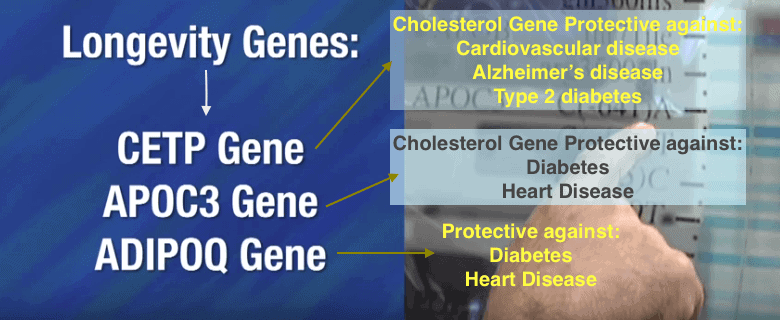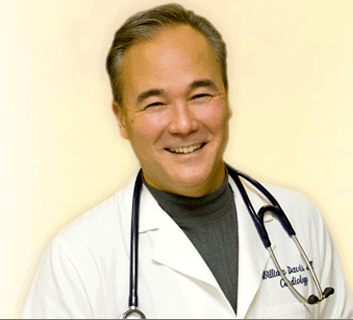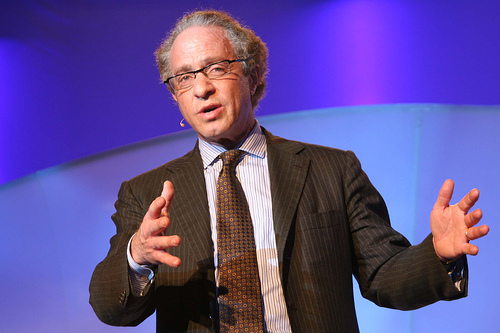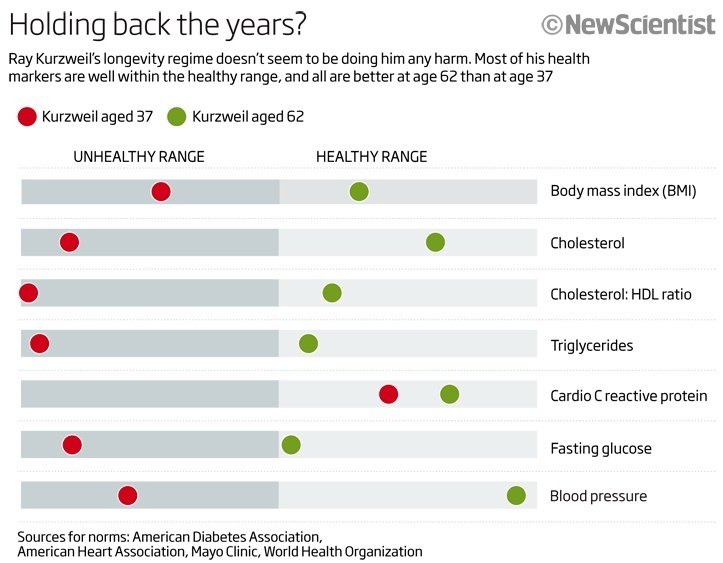How Superagers Age Superbly and Why You Can Too!
Superagers have the longevity genes to help them age superbly, but genes are just 20% of the battle. The other 80% is your fight and one worth doing. Watch the superager’s videos and learn how epigenetics can help you increase your healthspan.
INVARIABLY, WHEN the topic of aging pops up at any gathering of people, you’ll hear the majority express that they don’t want to live past 80, or some similarly low number of years.
When I probe those people with such low expectations, I hear the same explanation:
I just don’t want to get old and decrepit!
We tend to link “old age” with “infirmary”, “incapacity” and “decrepitude”. But what if you could be spry at 80 — wouldn’t you want to live that long and beyond if your physical and mental constitution was robust?
If you need some examples, read on and meet some “superagers”. You’ll find out that they have some genetic advantages over most of us, but what we can do is use the science of epigentics to inform certain lifestyle changes to make the diligent among us superages as well!
Lifestyle Attributes of the Superagers
“Superagers” is a term coined by the neurologist Marsel Mesulam, says Dr. Lisa Feldman Barrett, and refers to those 65 and older (usually much older) whose memory and attention is not only above average for their age, but is on par with healthy, active 25-year-olds.
How do you achieve that, you may wonder?
Work hard at something, Dr. Barrett says. She believes that one common factor Superagers have in common is that they engage in demanding mental exercise; that they continually challenge themselves to learn new things outside of their comfort zone.
In her article about superagers, Dr. Barrett admonishes us not to spend the last half of our life seeking ways to live on autopilot free of cares, concerns and the normal stress of life, but to engage in activities that provoke change and are challenging.
Yes, chronic stress can kill you, or certainly shorten your life. Nobel Laureate Dr. Elizabeth Blackburn’s research showed us this by revealing how chronic stress actually shorten telomeres, and thereby, lifespan — but that’s not the kind of stress that help make Superagers thrive.
Research suggests, says Dr. Barrett, that you need some amount of stress in your life if you want to stay mentally sharp – in particular, the momentary stress that comes with hard work. Your nervous system evolved so that occasional bouts of stress, where you tax your body and brain for a short time, is necessary to keep your brain healthy as you age.
Superagers have these five attributes in common:
- They possess enough grit to persevere in the face of unpleasantness.
- They are able and willing to engage in strenuous mental activity on a regular basis, even if it feels momentarily unpleasant.
- They exercise.
- They eat healthy food and get enough sleep.
- And, they have specific genes that have been identified, which I’ll get to next.
Click here for more on Dr. Barrett and the book she wrote.
Dr. Lisa Feldman Barrett is a University Distinguished Professor of Psychology at Northeastern University and the author of How Emotions Are Made. Read her article from which I extracted the summary above.
Superager Genes and Your Epigenetics
Dr. Nir Barzilai studies old people; very old people. Not only are his subjects very old, but they’re unusually healthy. Spry even. He wanted to find out why. So like any good scientist, he gathered them together and studied them and their genetic code.
Dr. Barzilai’s work focuses on the genetics of exceptional longevity. He has hypothesized and demonstrated that centenarians have protective genes which allows the delay of aging or for the protection against age-related diseases. He discovered the first “longevity genes” in humans:
These longevity genes were found in the majority of the cohort Dr. Barzilai studied. Interestingly, these genes, perhaps in combination with the nutritious diets that many of his subjects claimed they practiced, may be responsible for outstanding HDL results.
HDL (the so-called “good cholesterol”) was tested to be well above 80 mg/dL. Many of those tested had HDL between 100 and 150 mg/dL . Keep in mind that the overall population in the U.S. averages about 45
mg/dL for men and 55 mg/dL for women. (Yes, higher is better.)
Cardiologist Dr. William Davis of “Wheat Belly” fame says:
Very high HDL values, for instance, are associated with extreme longevity. Centenarians typically have values of 90 mg/dl or higher. Higher HDLs are also associated with less risk for diabetes, hypertension, cancer, and dementia. Conversely, low values for HDL cholesterol can suggest that some bad things are going on in health.
What if you don’t have longevity genes?
Odds are that you and I don’t have the longevity genes that enabled Dr. Barzilai‘s cohorts to live healthily pretty much to the 100 year mark and beyond.
Don’t despair.
What we have is the capability to practice what epigenetics preaches, which is that we have some control over how our genetics are expressed; ie: “turned on” or “turned off”.
Epigenetics is the study of biological mechanisms that switch genes on and off; meaning, epigenetics essentially affects how genes are read by cells, and subsequently how they produce the complex protein protein molecules that trigger various biological actions to carry out life functions.
The website What Is Epigenetics.com summarizes the powerful impact of epigenetics thus:
- Epigenetics Controls Genes. Certain circumstances in life can cause genes to be silenced or expressed over time. In other words, they can be turned off (becoming dormant) or turned on (becoming active).
- Epigenetics Is Everywhere. What you eat, where you live, who you interact with, when you sleep, how you exercise, even aging – all of these can eventually cause chemical modifications around the genes that will turn those genes on or off over time. Additionally, in certain diseases such as cancer or Alzheimer’s, various genes will be switched into the opposite state, away from the normal/healthy state.
- Epigenetics Makes Us Unique. Even though we are all human, why do some of us have blonde hair or darker skin? Why do some of us hate the taste of mushrooms or eggplants? Why are some of us more sociable than others? The different combinations of genes that are turned on or off is what makes each one of us unique. Furthermore, there have been indications that some epigenetic changes can be inherited.
- Epigenetics Is Reversible. With 20,000+ genes, what will be the result of the different combinations of genes being turned on or off? The possible arrangements are enormous! But if we could map every single cause and effect of the different combinations, and if we could reverse the gene’s state to keep the good while eliminating the bad… then we could theoretically* cure cancer, slow aging, stop obesity, and so much more.
So, we probably don’t have longevity genes, per se, that do all that protective stuff cited in the illustration above (and the video below), but as Dr. Nir Barzilai’s research indicates — only 20% of our aging is modulated by our genetics, leaving 80% influenced by our environment, which is where epigenetics comes into play.
You influence your gene expression (on or off) by what you do or don’t do, and crazy as it may be, such can leap to the next generation, as you can read my article, Behavior and Epigenetics — The Surprising Reasons Your Kids Care About Your Genetics.
By way of example, let’s take a quick look at how Ray Kuzweil turned around some bad genes, and then check a list of things all of us can do to increase our HDL, the most common one biometric that the longevity genes seem to affect.
Ray Kurzweil is a fine example of epigenetics in action
Author, inventor and futurist, Ray Kurzweil provides a good example. His father died very young from various complications of heart disease and diabetes. Ray’s genome indicated he would meet the same fate, but he intervened.
He had diabetes at age 32 and now does not. His fasting glucose level was 185 milligrams per deciliter in 1985 (well into the diabetic range), and is now down to 95 today.
“I’ve had no indication of diabetes for over 20 years now,” he says, “although if I stopped my program, my genetic predisposition to insulin resistance would return.”
What Ray Kurzweil did was to eat a healthy low carb diet, exercise and take supplements known for their ability to help reduce high blood sugar. This protocol made all the difference in the world and overrode his genetic predisposition.
Check this out and get impressed by what lifestyle changes can do to positively (or negatively) influence what physiological outcomes your genes influence:
Ray Kuzweil Blood Biomarkers
Read my article, You Absolutely Need To Lower Your Blood Sugar.
The HDL Example of how lifestyle changes can enhance your health
Returning to HDL and its noted importance to longevity, wikiHow lists six things you can do to improve your HDL even if you don’t possess the longevity genes that abundantly express it are:
- Exercise — If overweight, combining aerobic and resistance training exercises has been shown to improve HDL by 5% in two months.
- Stop smoking — Along with a long list of deleterious health effects, smoking can lower HDL levels by an average of five points and increase total blood cholesterol by increasing LDL, the so-called “bad” cholesterol.
- Reduce alcohol consumption — If drinking alcohol is important to you, reduce it to one serving a day and make it red wine, as its high antioxidant content may help prevent blood vessel damage.
- Eat healthy fats — Choose monounsaturated fats (olives, nuts, avocados), polyunsaturated fats (walnuts, salmon, mackerel) and omega-3 fats (fish and flax seed); reduce saturated fats (meat, dairy); avoid trans fats (cookies, crackers, fried foods and margarine).
- Eat dark colored fruits and veggies — They’re rich in antioxidants, particularly colorful compounds called anthocyanins. Research shows that consuming anthocyanins can increase HDL levels by almost 14%, while decreasing LDL levels. Excellent sources of anthocyanins include plums, purple and red grapes, raspberries, blackberries, purple cabbage, and eggplant.
- Reduce your medications — Grab your doctor and have a discussion about reducing statins (which only increase HDL by a maximum of 10%) and taking high-dose niacin (Niaspan, Niacor), which is considered an effective medication for increasing HDL levels.
Presumably, if you were blessed with the longevity genes that Dr. Barzilai discovered it wouldn’t much matter if your lifestyle was tuned to improve HDL and lower LDL. But since most of are not so blessed, you now know about six actions to take to countermand any lack of HDL-supporting genes in your genome.
The Longevity Genes Project and The Superagers
What I’ve been telling you about Dr. Barzilai and his longevity study comes from his work with the Albert Einstein College of Medicine’s Longevity Genes Project.
In the video below, Dr. Barzilai expresses his confidence that one day drugs will be created to imitate what the longevity genes are doing.
But why leave it to the future?
An anti-aging drug based on Dr. Barzilai’s work was supposed to clear testing and approval and be on the market in 2011, but guess what? Now six years later and it’s not. Which again begs the question: Why leave your healthy lifespan in someone else’ hands?
The whole point of the book that I’m writing, The Ageproof Method, 12 Biohacks for A Long and Strong Life, is to demonstrate that there are sufficient protocols, techniques, supplements, foods and exercises available to you now to measurably extend your healthspan.
As I already outlined, this is what epigenetics is all about — influencing gene expression through your behavior.
As you watch the videos and hear the emphasis on “good genes” remember that 80% of the influence of your health and longevity comes from your environmental inputs (such as your lifestyle, the health of your environment, etc.) — not your genes alone.
To learn more about what you can do now to help ensure you live a long and strong, check out these articles I’ve written:
- A 75-Year Old Surgeon’s 7 Anti-aging Secrets
- 3 Ways To Stay Young
- Begin Your Anti-aging Program With These 12 Tactics
- 12 Ways To Increase Your Healthspan
And they’re plenty more under the categories of “age better“, “diet and nutrition“, “exercise“and “test and assess“.
That said, meet Dr. Nir Barzilai and four of his Superagers:
Lily Port, “The Powerhouse”, age 96
Her bottom line: Eat less than you want and stay very active, including exercise. Enjoy what you’re doing; particularly, enjoy your life partner.
Harold Laufman, “The Eclectic Achiever”, age 94
His bottom line: Wake up every day with an agenda for the day. Stay engaged and impassioned. Love is a very important part of life that should not be denied.
Irma Daniel, “The Pragmatic Survivor”, age 103
Her bottom line: Be positive, forgive everyone, exercise, eat nutritious foods and work — “It’s the best thing for not getting old.”
Irving Kahn, “The Eternal Businessman”, age 104
His bottom line: Wake up in the morning and have something to look forward to. Stay interested. Absorb information. Keep your mind challenged.
Your Takeaway
Remember this:
Odds are, you aren’t blessed with longevity genes. But you can be blessed with the grit to apply yourself to using epigenetics to create the right environment for you to shape how your genes are expressed; meaning, to turn on the “good” ones and turn off the “bad” ones.
Go examine the chart above showing Ray Kurzweil’s biomarkers for inspiration.
If you need an attitude adjustment, read again the five attributes that Superagers have in common. Then make them your own.
Last Updated on February 7, 2024 by Joe Garma









